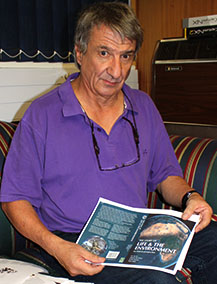 |
Prof. Jo van As earlier this year with proofs of the book The Story of Life & the Environment: An African Perspective.
Photo: Leatitia Pienaar
10 August 2012 |
The planet has more species than ever before, but humans are responsible for the biggest mass extinction of all times. This is according to Prof. Jo van As, Head of the Department of Zoology and Entomology. He was speaking at the launch of the book The Story of Life & the Environment: An African Perspective.
The book was published by Random House Struik in July 2012 and is a sister publication of The Story of Earth & Life by Prof. Bruce Rubidge, which was published in 2005.
The Story of Life & the Environment: An African Perspective took five years to complete. Prof. Van As was the compiling author, with Prof. Johann du Preez, Head of Plant Sciences at our university, Prof. Leslie Brown of Unisa and Prof. Nico Smit of the North-West University as co-writers.
Prof. Van As said, “No other species has destroyed the earth as we have done. Biological diversity disappears at the rate of mass extinction. The effects of human activities on the biological diversity is bigger that the extinction of the dinosaurs.”
He, however, added that The Story of Life & the Environment: An African Perspective does not sketch a doomsday scenario. It has also a message of hope. Prof. Van As said it was good to see progress in conservation and care for the environment. Trans-frontier parks the size of some countries are a good example of work in this regard.
Mr Stephen Johnson, chairperson of the board of Random House Struik, said at the launch that the publishing house was proud to be associated with the impressive book. The publication will be a touchstone for thoughtful readers for a long time. It will also remain a general book for the public and learners on the topic. The content and design was done in such a way that the publication will be relevant to all audiences.
The Afrikaans version of the book, Die Verhaal van Lewe en die Omgewing, will be published soon.